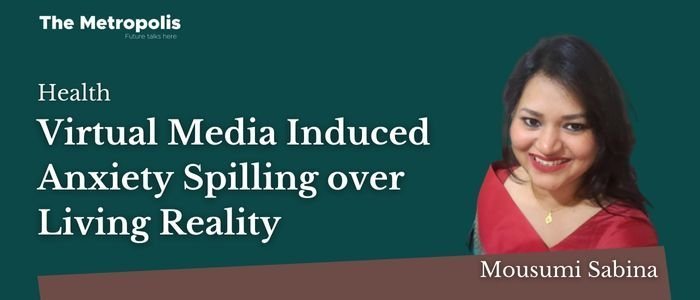What are the impacts of using social media and how to reduce the negative impacts on our mental health?
In this time of digital advancement, we are so connected with the whole world through many electronic media, especially social media. And there is no control over how long we should use it, many of us use it for longer hours which might harm our mental health.
Many new things are happening on social media as well as new terms like doom scrolling, headline anxiety, and headline stress disorder are hot topics nowadays. Moreover, in the last couple of months and years, we are facing stress related to social media and its constant news, it is like nonstop beats without a pause.
For example, pandemics, injustice, accidental news, the Taliban regime in Afghanistan, the war in Ukraine, Protests in Iran, young people’s deaths in South Korea on the night of the Halloween celebration, and a lot more controversial negative news from all over the world.

Through social media, all the news reaches people faster than ever. Therefore, we cannot ignore the reality of digitalized life where people watch, read, and discuss news like that, consequently, it affects us in many ways emotionally. We sometimes mentally revisit that horrific news that we do not need to.
Again, when we are constantly getting all the anxiety-induced news, it makes us feel helpless. And digital media brings distressful news nonstop in a manner that we are unable to stop reading or getting the notification.
Our fear of not knowing the latest news or trends or talks on different issues occupies us emotionally too. Think about yourself in recent days – maybe you were in the middle of doing something and suddenly a shocking news notification popped up. You saw the headline and tried not to get distracted by reading it at that moment. Your reaction to that bad news is on hold, and you are preserving it somewhere in your mind. Also, to get more views social media reinforces more negative news or incident of negative news which leads to emotional distress and elevated anxiety-like symptoms.
One study in 2022 found that the more people seek information related to Covid-19 across various mediums – television, newspaper, and social media the more likely they are vulnerable to report emotional distress. (Hwang, J., et al., International Journal of Environmental Research and Public Health, Vol. 18, No. 24, 2021).
However, with the growing concerns of overusing social media another new term emerges to encounter the issue of excessive use of social media which is “digital detox”. This refers to a long-time absence from social media, which is self-initiated and helps people get rid of excess anxiety due to the news and posts of other people on social media. This idea promotes a low level of social media usage for better mental health by reducing distress. Also, many psychologists and researchers in social studies indicate that presenting self as “my fun-filled life” can have psychological costs if the validation is not forthcoming and leads to self-doubting.
Some strategies that may help to reduce the risks are –
-
We can set a family rule of not bringing phones to the dinner table or while eating.
-
When waiting in line, rather than looking at your screen, you can look around and focus on your breathing to keep your stress in balance and become mindful of your surroundings.
-
Turning off the news notifications other than a fixed time of the day.
-
Try to fix a time limit for using any kind of social media. For example: fixing a time limit of 20/30 minutes for using social media will save you a big chunk of time.
-
When you limit your social media usage time, you will be able to save time which you can use to develop other skills like journaling. It can be done in many ways. In your journal, you can write about your worries and thoughts. Thus, by writing, you can address what are you anxious about. This kind of journaling will help to shift the attention from thinking about the anxiety and processing our emotions related to our negative thoughts like sadness, fear, etc.
-
Learn something new or start a new hobby. At any age, anyone can develop new hobbies or can learn basic skills like cooking, sewing, crafting, etc. Those new skills will help one to be active in a positive way.
Furthermore, in our everyday life stress, and anxiety is very natural. We can manage those by taking effective steps which work for us best. We need to learn relaxation techniques to manage our stress whether it is related to our work, studies, or our life, in general. We need to look at our existing strategies which are helping and keep adding more strategies to deal with anxieties about the future or the increasing new dimensions of anxiety known as social media anxiety.
Mousumi Sabina is a Bangladeshi Counselling Psychologist, M.Sc., and American Board of Examiners Certified Practitioner in Psychodrama, Sociometry, and Group Psychotherapy. At present, she resides in New York, USA




I blog quite often and I genuinely thank you forr
your content. Thee article hass really peaked my interest.
I will book mark your sute and keep checking for new details about once per week.
I opted in for your RSS feed ass well.
my hommepage … youtube